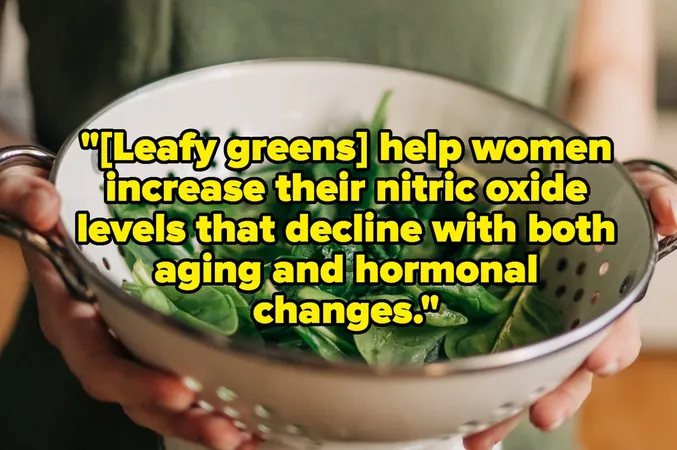
Unlock the Secret to Radiant Health in Your 40s: Why Diet Matters More Than Ever!
2025-04-28
Author: Jia
Are you a woman in your 40s feeling the shifts that come with age? If you've navigated the world of fad diets and health crazes, it’s time to pivot and embrace nutrition tailored for this unique stage of life! As your body undergoes changes, it’s crucial to make dietary adjustments that support your health and vitality.
Embracing Changes: The New Nutritional Landscape
As Dr. Stephanie Faubion, medical director of The North American Menopause Society, points out, many women start experiencing perimenopausal symptoms in their mid-30s, with menopause typically beginning around age 45. While these changes can feel daunting, you hold the power to age gracefully through informed eating choices.
Combat Weight Gain with Smart Dietary Shifts
Noticed some weight creeping around your belly? You're not alone. After 50, muscle mass declines at a rate of 1% annually, and most midlife adults gain about 1.5 pounds each year. But don’t despair! Changes in your diet can prevent this relentless march of weight gain, as reminders from experts like Faubion stress that exercise alone won’t cut it.
Here’s an Opportunity: Nitrate-Rich Foods to the Rescue!
Maryann Jacobsen, a registered dietitian specializing in midlife health, emphasizes this phase as a "window of opportunity" for better nutrition. Increasing your intake of nitrate-rich vegetables—think leafy greens, celery, and beets—can significantly enhance blood flow and manage hormonal changes.
Micronutrients: The Unsung Heroes of Midlife Nutrition
Your body might absorb fewer vital nutrients as estrogen declines, making it essential to focus on micronutrients like magnesium, zinc, choline, and omega-3s. Expert recommendations suggest prioritizing foods rich in these essential elements to sustain energy levels and overall health.
Don’t Skimp on Calories or Protein!
Courtney Delpra, a dietitian at the Cleveland Clinic, warns against extreme calorie restriction, especially as estrogen levels dip and muscle mass diminishes. To support your metabolism, aim for 20-30 grams of protein at each meal from sources like lean meats, fish, beans, or nuts.
Fiber: Your Heart's Best Friend
While protein is essential, don't neglect fiber! Increasing your fiber intake can help manage the rise in cholesterol levels many women experience during menopause. Add fiber-rich foods like berries, whole grains, and nuts to your diet to keep your heart healthy.
The 'Good Enough' Mindset: Flexibility is Key
Instead of striving for dietary perfection, embrace a flexible approach. Nutritionist Jennifer Salib Huber suggests adopting a ‘good enough’ mindset that prioritizes enjoyable and nourishing eating without the guilt associated with rigid dieting.
This is your time to thrive! By making mindful dietary choices, you can turn the inevitable changes of aging into an opportunity for renewed health and vibrancy. Remember, it’s never too late to transform your plate!




 Brasil (PT)
Brasil (PT)
 Canada (EN)
Canada (EN)
 Chile (ES)
Chile (ES)
 Česko (CS)
Česko (CS)
 대한민국 (KO)
대한민국 (KO)
 España (ES)
España (ES)
 France (FR)
France (FR)
 Hong Kong (EN)
Hong Kong (EN)
 Italia (IT)
Italia (IT)
 日本 (JA)
日本 (JA)
 Magyarország (HU)
Magyarország (HU)
 Norge (NO)
Norge (NO)
 Polska (PL)
Polska (PL)
 Schweiz (DE)
Schweiz (DE)
 Singapore (EN)
Singapore (EN)
 Sverige (SV)
Sverige (SV)
 Suomi (FI)
Suomi (FI)
 Türkiye (TR)
Türkiye (TR)
 الإمارات العربية المتحدة (AR)
الإمارات العربية المتحدة (AR)